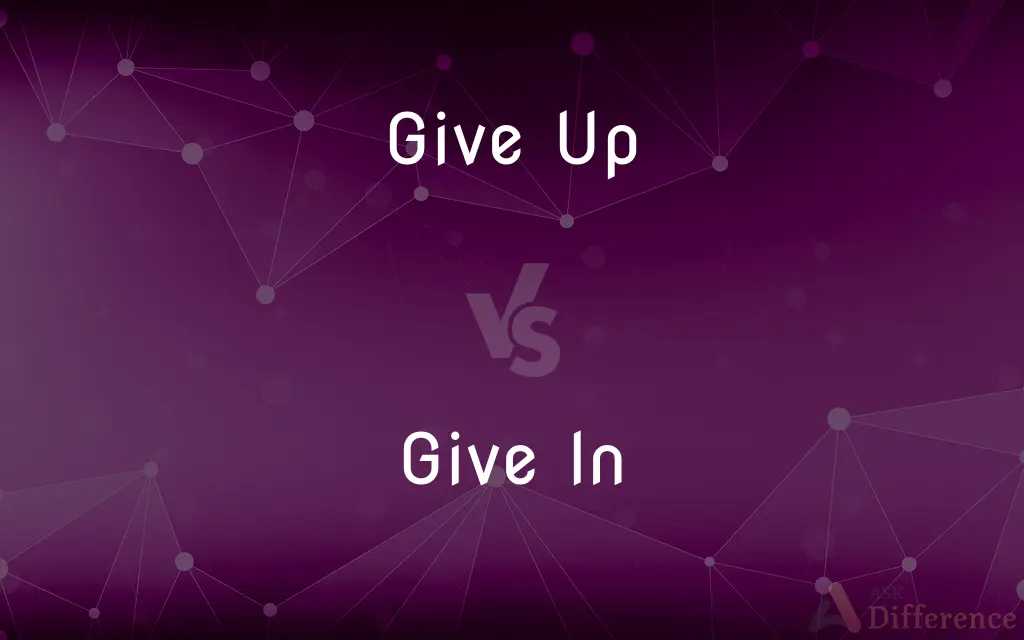Give Up vs. Give In — What's the Difference?
By Tayyaba Rehman & Fiza Rafique — Published on October 15, 2023
"Give up" means to quit or abandon, while "give in" means to yield or submit to pressure.

Difference Between Give Up and Give In
Table of Contents
ADVERTISEMENT
Key Differences
"Give up" is a term that primarily implies a cessation of effort or a decision to stop trying altogether. When someone says they're going to give up, they're expressing a wish to quit or abandon a particular activity, ambition, or goal. This decision might stem from frustration, exhaustion, or a realization that continued effort is futile.
On the other hand, "give in" is more about relenting or yielding to a certain force, demand, or pressure. To give in doesn't necessarily mean one is abandoning their ambition, but rather that they're choosing to submit, often temporarily, due to some kind of external or internal pressure.
In certain contexts, "give up" and "give in" can seem similar, especially when one submits to pressure and decides to quit. However, "give up" emphasizes the act of quitting, while "give in" focuses on the act of yielding or submitting.
For instance, consider a child asking their parent for candy. If the parent eventually allows it after initially resisting, they "give in" to the child's request. Conversely, if someone is trying to fix a broken device and after multiple attempts decides it's irreparable, they might "give up."
Comparison Chart
Primary Meaning
To quit or abandon
To yield or submit
ADVERTISEMENT
Emphasis
Cessation of effort
Relenting to pressure
Temporality
Often permanent
Can be temporary
Common Usage
"I give up on this puzzle."
"I give in; you were right."
Degree of Persistence
Indicates no further effort
Might indicate a brief cessation or agreement
Compare with Definitions
Give Up
To quit an endeavor.
I had to give up my attempts to fix the car.
Give In
To relent in one's opposition.
Despite his reservations, he gave in and tried the spicy food.
Give Up
To cease an activity.
I had to give up running due to my knee injury.
Give In
To yield to pressure or demands.
After hours of negotiation, he finally gave in.
Give Up
To surrender oneself.
The criminal gave up to the police.
Give In
To submit or surrender.
She refused to give in to her fears.
Give Up
To abandon hope.
After hours of searching, they gave up on finding the lost dog.
Give In
To acknowledge defeat.
The team gave in after a tough match.
Give Up
To relinquish possession.
He gave up his seat to the elderly woman.
Give In
To allow something after resistance.
She didn't want to, but she gave in and let her child have the toy.
Common Curiosities
Can "give up" and "give in" be used interchangeably?
Not always. While similar, "give up" emphasizes quitting, and "give in" emphasizes yielding.
Is "give up" a more definitive action?
Generally, yes. "Give up" often indicates a final decision to quit.
Is "give up" about letting go of possessions too?
Yes, like "giving up one's seat" or "giving up one's claim."
Is "give in" always due to external pressure?
Not always; one might "give in" to their own desires or emotions.
Can one "give in" to positive feelings?
Yes, one can "give in" to feelings like joy, love, or excitement.
Can "give in" imply a momentary submission?
Yes, one might "give in" temporarily and later resume their resistance.
Can "give in" be used in a positive sense?
Yes, like "giving in to love" or "giving in to laughter."
Is "give up" related to failure?
Not always, but it can indicate an acceptance of inability or defeat.
Can "give up" be used in a physical sense?
Yes, like "give up one's weapons" or "give up one's position."
Is "give up" always negative?
Not necessarily. Sometimes "giving up" might be the best decision.
Does "give in" always mean a loss?
Not always; sometimes it's just an agreement or temporary submission.
If someone stops a bad habit, is it "give up" or "give in"?
It's "give up," like "give up smoking."
Does "give in" indicate weakness?
Not necessarily. Sometimes it's a strategic or emotional decision.
Can someone "give in" after a long resistance?
Yes, "give in" often comes after some form of resistance.
Do both terms imply a change in decision or stance?
Generally, yes. Both indicate a shift from a previous position or intention.
Share Your Discovery

Previous Comparison
Gross Primary Productivity vs. Net Primary Productivity
Next Comparison
Biological Control vs. Chemical ControlAuthor Spotlight
Written by
Tayyaba RehmanTayyaba Rehman is a distinguished writer, currently serving as a primary contributor to askdifference.com. As a researcher in semantics and etymology, Tayyaba's passion for the complexity of languages and their distinctions has found a perfect home on the platform. Tayyaba delves into the intricacies of language, distinguishing between commonly confused words and phrases, thereby providing clarity for readers worldwide.
Co-written by
Fiza RafiqueFiza Rafique is a skilled content writer at AskDifference.com, where she meticulously refines and enhances written pieces. Drawing from her vast editorial expertise, Fiza ensures clarity, accuracy, and precision in every article. Passionate about language, she continually seeks to elevate the quality of content for readers worldwide.














































